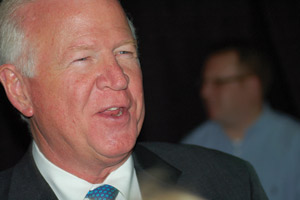Here’s a nominee for one of the 111th Congress’ most dubious earmarks: $3 million to subsidize a mining concern owned primarily by Goldman Sachs, recipient of a $10 billion bailout (since repaid), and two hedge funds. Politico reports that the measure was slipped into the House defense appropriations bill by Rep. Jerry Lewis (R-Calif.), the top Republican on the House appropriations committee who’s regularly featured on Citizens for Responsibility and Ethics’ annual list of the most corrupt members of Congress. How’d he earn a spot on the list? For allegedly trading earmarks for campaign contributions—a matter for which he’s presently under federal investigation.
Lewis and his supporters say this particular earmark is a matter of national security. The mining project in question, run by a company called Molycorp Minerals, is harvesting rare elements that are an ingredient in the magnets used in precision-guided missiles and smart bombs. (Among Lewis’ top contributors are defense and aerospace firms that produce such munitions.) China, as Politico notes, is the world’s primary producer of these hard-to-come-by minerals, but the country has threatened to stop exports, prompting a search for other sources.
Even so, the question remains: Why use taxpayer money to aid a project that Goldman, Pegasus Partners, and Resource Capital Funds invested in with the clear expectation of turning a profit? Politico reports:
“It’s probably good business, and we probably don’t need to subsidize it,” said Ryan Alexander, president of the nonpartisan Taxpayers for Common Sense.
Moreover, Alexander said, if getting the elements from the mine is really a national security issue, then the funding request would have come through the Department of Defense — and not through a lawmaker’s earmark.
“If this is critical to national security, and the private equity firms that own Molycorp can’t find another $3 million to meet the needs of the Mountain Pass mine, there still is no excuse for this being an earmark,” Alexander said. “DOD can request programmatic funding so those funds are weighed against other security priorities rather than being singled out by one member of the House Appropriations Committee.”
The earmark isn’t a done deal yet. It still has to survive the conference process to reconcile the House and Senate versions of the bill, a process expected to begin later this month. Stay tuned.
Follow Daniel Schulman on Twitter.











